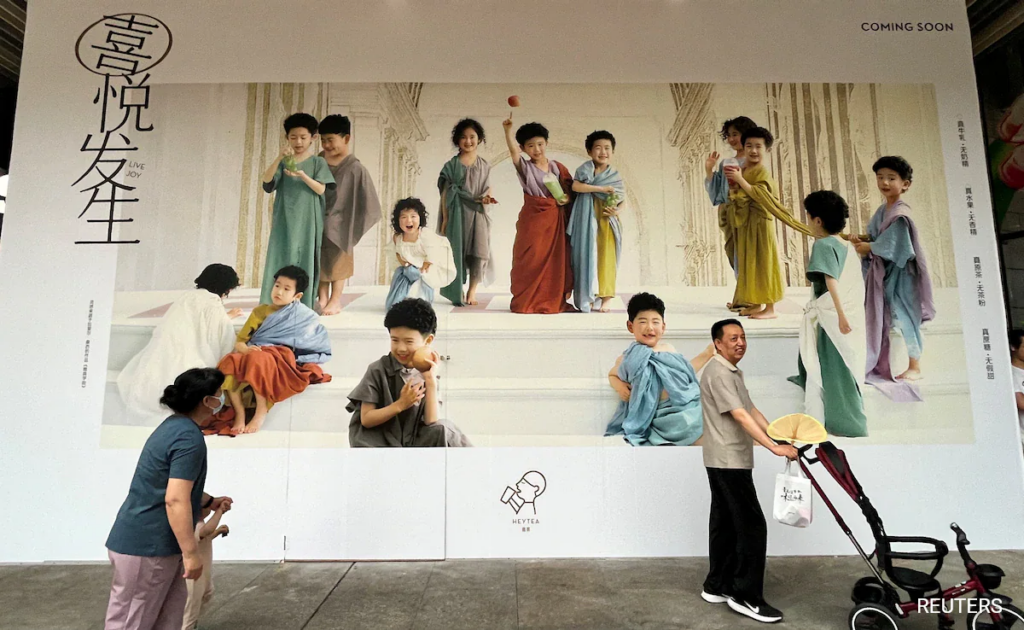
China is grappling with a worsening population crisis, as rapid aging and declining birth rates threaten long-term demographic stability. Younger generations are increasingly rejecting marriage and parenthood, prompting the Chinese Communist Party to implement aggressive pro-birth policies. A nationwide campaign aims to boost fertility, introducing incentives such as childcare subsidies.
At ‘Two Sessions’, Premier Chang outlined government plans to reverse the trend through financial and structural support for families. Simultaneously, the National Health Commission launched the 2025 Population High-Quality Development Initiative, mandating local health commissions to devise comprehensive fertility measures. Running from March to October, this effort seeks long-term solutions to slow population decline, but whether these interventions will shift societal attitudes remains uncertain.
Across China, local governments are introducing measures to boost birth rates and support families. Ju Jang is developing an integrated system covering marriage, parenting, education, and employment while easing marriage restrictions for college students and launching online dating platforms.
Financial incentives have also been rolled out. In Hohhot, Inner Mongolia, families with a third child receive a 100,000 yuan (about $14,000) subsidy. Dalian is reinforcing maternity leave policies, while Ningxia has extended marriage leave to 13 days, maternity leave to 60 days, and added 10 days of parental leave for families with young children.
Concerns about China’s declining birth rate remain significant, as many young people are increasingly reluctant to start families. A resident from Shanghai’s Pudong district expressed worry about the aging generation, noting that his sons—both in their 30s—have no desire to have children. He suggested that a majority of young people share this sentiment, citing economic uncertainty and a bleak outlook for the future. Despite government efforts to introduce policies that encourage childbirth, skepticism persists. The weak job market has left many struggling, with some facing periods of unemployment before securing stable work. In Shanghai, young professionals also view rising living costs as a major barrier to marriage and parenthood. One individual described incentives such as childcare subsidies as ineffective, arguing that financial burdens make it impractical for many to raise a child. These concerns highlight growing doubts about long-term demographic recovery.
Marriage is increasingly seen as an unattainable luxury in Beijing, where living costs continue to soar. A monthly salary of 10,000 Yuan (approximately $1,400) is considered decent, but for many, homeownership remains a distant dream. The financial strain extends beyond housing—raising a child comes with overwhelming expenses, with necessities adding to the burden. Faced with these challenges, some feel trapped in a cycle of economic hardship, questioning whether bringing children into such an environment is a responsible choice. Would you like further refinements or an alternative tone?
An Australian-based Chinese historian has described the CCP’s push for birth policies as a sign of growing desperation, warning that plummeting birth rates may be irreversible. The economic fallout is already visible, with local governments struggling financially and fewer people willing to marry or have children. Official data from the Ministry of Civil Affairs highlights the trend—nationwide marriages in 2024 dropped 20.5% from the previous year to 6.106 million, marking a 45-year low, while divorces edged up 1.1% to 2.621 million.
China’s population continues to decline, with official statistics showing a 2024 birth rate of just 6.77 per thousand and a natural growth rate of -0.99 per thousand, marking the third consecutive year of negative growth. According to a Chinese Professor of Sydney University of Technology, the CCP’s 30-year one-child policy, including late-term forced abortions, erased one to two generations, significantly weakening the demographic foundation. Meanwhile, younger generations struggle with the soaring costs of education, housing, and healthcare, further exacerbated by prolonged COVID lockdowns.
The professor observed that many young people perceive having children under an authoritarian regime as ethically unacceptable. Even those with the financial means are choosing not to, further contributing to the declining birth rate. He criticized the CCP’s parental incentives, describing them as superficial solutions that fail to address deeper societal issues. According to him, local officials are likely to manipulate statistics to meet quotas, presenting a false narrative through state media. He emphasized that the stagnant economy and lack of freedom continue to fuel widespread hopelessness among the youth.
Reports circulating online have highlighted concerns regarding elderly individuals in Beijing and Shanghai who have passed away alone, with claims suggesting that their accumulated assets were later taken by the state. A particular online skit drew attention to this issue, portraying a conversation in which a lawyer cautioned a young individual about the potential consequences of remaining unmarried and childless, implying that their estate could be confiscated. The response reflected a sense of resignation, with the individual expressing that they had nothing to leave behind except their own existence. Similarly, during Shanghai’s 2022 lockdown, quarantine enforcers allegedly pressured a couple to adhere to strict isolation measures, warning that failure to comply could result in security penalties affecting multiple generations. Their response, which declared their refusal to contribute to future generations, resonated widely across online platforms, underscoring growing frustrations with governance, financial instability, and societal constraints.